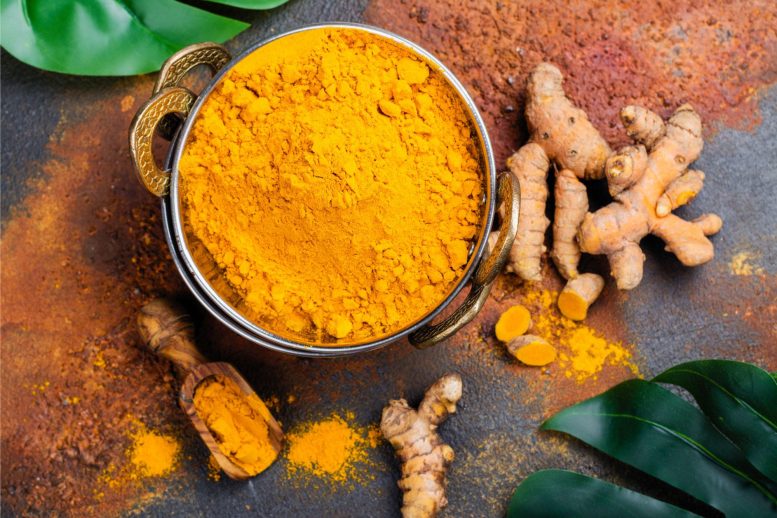
A recent study reveals that curcumin, a compound found in turmeric, may be equally effective as the drug omeprazole in treating symptoms of indigestion, with significant symptom reductions observed in both treatment groups over a period of 28 to 56 days. Though the study, conducted on 206 individuals in Thailand, suggests promising results, the researchers acknowledge its small scale and call for larger, long-term studies to further validate the findings.
Researchers suggest that the findings could warrant consideration in clinical practice.
A first-of-its-kind study published in the journal BMJ Evidence-Based Medicine indicates that a natural compound in the culinary spice turmeric might have similar efficacy as omeprazole—an acid-reducing drug—in managing indigestion symptoms.
Extracted from the root of the Curcuma longa plant, turmeric possesses a compound named curcumin. Believed to exhibit anti-inflammatory and antimicrobial characteristics, curcumin has historically been employed as a therapeutic agent in South East Asia, especially for indigestion-related issues.
Turmeric is derived from the root of the Curcuma longa plant. It contains a naturally active compound called curcumin thought to have anti-inflammatory and antimicrobial properties, and has long been used as a medicinal remedy, including for the treatment of indigestion, in South East Asia.
But it’s not clear how well it compares with conventional drugs for this indication, largely because there have been no head-to-head studies.
The researchers therefore randomly assigned 206 patients aged 18-70 with recurrent upset stomach (functional dyspepsia) of unknown cause, recruited from hospitals in Thailand between 2019 and 2021, to one of three treatment groups for a period of 28 days.
These were: turmeric (two large 250 mg capsules of curcumin 4 times a day) and one small dummy capsule (69 patients); omeprazole (one small 20 mg capsule daily and two large dummy capsules 4 times a day (68 patients); and turmeric plus omeprazole (69 patients).
Omeprazole is a proton pump inhibitor, or PPI for short. PPIs are used to treat functional dyspepsia, the symptoms of which include feeling excessively full after food (postprandial fullness), feeling full up after only a little food (early satiety), and pain and/or burning sensation in the stomach and/or food pipe (epigastric pain).
But long-term use of PPIs has been linked to increased fracture risk, micronutrient deficiencies, and a heightened risk of infections, note the researchers.
Of the 206 patients enrolled, 151 completed the study, with 20 in the curcumin group;19 in the omeprazole group; and 16 in the combined treatment group, dropping out.
Patients in all three groups had similar clinical characteristics and indigestion scores, as assessed by the Severity of Dyspepsia Assessment score or SODA, at the start of the trial. Patients were reassessed after 28 days and then again after 56 days.
SODA scores indicated significant reductions in symptom severity by day 28 for pain (−4.83, –5.46 and −6.22) and other symptoms (−2.22, –2.32, and −2.31) for those in the combined, curcumin alone, and omeprazole alone groups, respectively.
These improvements were even stronger after 56 days for pain (−7.19, –8.07 and −8.85, respectively) and other symptoms (−4.09, –4.12 and −3.71, respectively).
SODA also captures satisfaction scores: these scarcely changed over time among the curcumin users, which might possibly be related to its taste and/or smell, suggest the researchers.
No serious side effects were reported, although liver function tests indicated some level of deterioration among curcumin users carrying excess weight, note the researchers.
They acknowledge the small size of the study, as well as several other limitations, including the short intervention period and lack of long-term monitoring data. Further larger, long-term studies are needed, they say.
Nevertheless, they conclude: “This multicentre randomized controlled trial provides highly reliable evidence for the treatment of functional dyspepsia,” adding that “the new findings from our study may justify considering curcumin in clinical practice.”
Reference: “Curcumin and proton pump inhibitors for functional dyspepsia: a randomised, double blind controlled trial” by Pradermchai Kongkam, Wichittra Khongkha, Chawin Lopimpisuth, Chitsanucha Chumsri, Prach Kosarussawadee, Phanupong Phutrakool, Sittichai Khamsai, Kittisak Sawanyawisuth, Thanyachai Sura, Pochamana Phisalprapa, Thanwa Buamahakul, Sarawut Siwamogsatham, Jaenjira Angsusing, Pratchayanan Poonniam, Kulthanit Wanaratna, Monthaka Teerachaisakul and Krit Pongpirul, 11 September 2023, BMJ Evidence-Based Medicine.
DOI: 10.1136/bmjebm-2022-112231
The study was funded by the Thai Traditional and Alternative Medicine Fund.









If you look around a bit you will find many studies of Cucumin being effective for pain, inflammation and reduction of dementia symptoms. Check it out. Pharma keeps those studies in the dark unless you look for it. Cheap, effective and natural. Been on it for a decade or more now. Made my own pills with black pepper. All the studies should have piperine added for higher blood levels of curcumin. However most studies don’t want two variables vs one so they only test Turmeric alone.
You might consider trying a little sublingally. It’s 3-5 times more effective than through you digestion system. Even though the goal is to reduce inflammation in the digestive system itself. It might affect the biome in a negative way. My family and I are taking raw (fresh) hemp flower(non psychoactive. (for cancer,colds and covid both prevention and treatment/cure) and fresh garden sage ( good for hypertension, mood stabilization, blood sugar, amoung other things.) Also since your cardiovascular system is the delivery system raising your heart rate expedites the whole process.